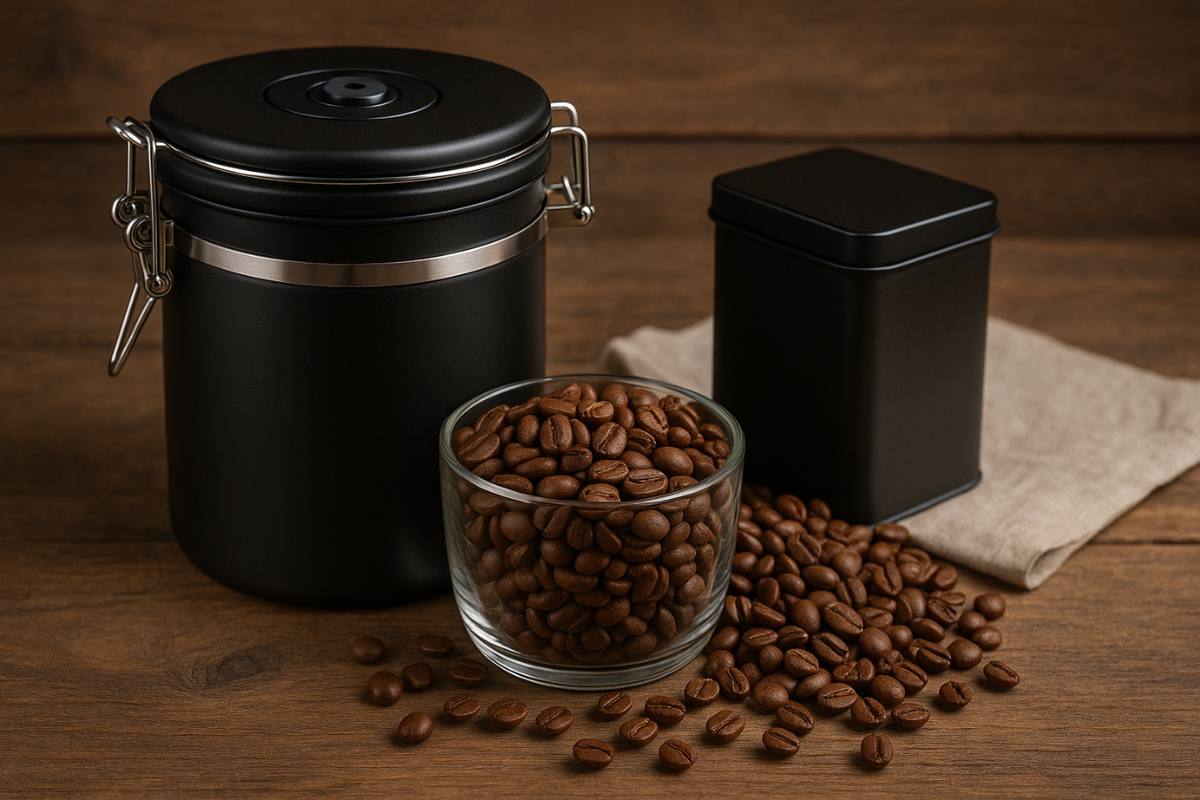Coffee is a delicate product. From the moment it’s roasted, it begins to lose its freshness, aroma, and complexity. Whether you’re a casual coffee drinker or a serious enthusiast, learning how to store your coffee correctly can make the difference between a rich, flavorful cup and a dull, flat one. In this guide, you’ll discover the best practices to keep your coffee fresh for as long as possible.
Why Coffee Loses Freshness
Coffee is affected by four main enemies:
- Air (Oxygen) – Oxidation dulls flavor and accelerates staleness.
- Moisture – Causes mold and affects solubility during brewing.
- Light – Degrades aromatic compounds.
- Heat – Speeds up chemical reactions and spoilage.
Proper storage aims to protect your coffee from all of these.
Whole Beans vs. Ground Coffee
One of the biggest decisions you can make to extend coffee freshness is choosing whole beans over pre-ground coffee.
Whole Beans:
- Retain flavor for 2–4 weeks after roasting.
- Best if ground just before brewing.
Ground Coffee:
- Begins losing aroma within minutes of grinding.
- Stays fresh for only about 1 week even in a sealed container.
Tip: Always buy whole beans and grind them fresh using a burr grinder.
Best Storage Containers
To preserve coffee freshness, invest in an airtight, opaque container. Here are some options:
1. Vacuum-Sealed Containers
- Use a hand pump or auto-vacuum system to remove air.
- Excellent for medium- to long-term storage.
2. One-Way Valve Bags
- Common in specialty coffee packaging.
- Allows CO₂ to escape while preventing air in.
3. Ceramic or Stainless Steel Canisters
- Block light and resist heat better than plastic or glass.
What to Avoid:
- Transparent glass jars (expose coffee to light)
- Thin plastic containers (let in moisture and odors)
- Coffee kept in the bag it came in (unless resealable with a valve)
Where to Store Coffee
Ideal Conditions:
- Cool (but not cold)
- Dark
- Dry
- Away from heat sources (like ovens or windows)
Kitchen Tips:
- Keep coffee away from stoves and direct sunlight.
- Avoid placing coffee near sinks or dishwashers (moisture zone).
- Place it in a pantry, closed cabinet, or drawer.
Should You Store Coffee in the Fridge?
No. Refrigerators are not ideal for coffee storage. Here’s why:
- Humidity: Condensation can form inside the container.
- Odors: Coffee absorbs nearby smells (like onion or garlic).
- Temperature Fluctuations: Opening and closing the fridge exposes coffee to changes in temperature and moisture.
Exception:
If you must store a large amount of unused coffee (e.g., months’ worth), freezing it in an airtight container may help. But only if:
- It’s stored in small, individual, vacuum-sealed portions.
- You don’t repeatedly thaw and refreeze it.
Buy Only What You Need
One of the easiest ways to keep coffee fresh is to buy it in smaller amounts:
- Purchase just enough for 1 to 2 weeks at a time.
- Choose roasters that indicate roast dates (not just expiration dates).
- If buying from a supermarket, avoid bulk bins (exposed to air and light).
Signs Your Coffee Is Stale
Wondering if your coffee has gone bad? Here are signs of stale coffee:
- Flat Aroma: Lacks the rich, enticing smell.
- Bitter or Sour Flavor: Harsh or overly acidic taste.
- No Bloom: When brewed, coffee doesn’t puff or expand due to loss of gases.
- Lifeless Appearance: Grounds appear dry and dusty.
Bonus: Tips for Long-Term Coffee Enthusiasts
If you’re diving deep into the world of specialty coffee, here are additional tips:
- Use a coffee journal to track roast dates and storage outcomes.
- Rotate beans based on freshness.
- Label storage containers with roast dates and bean origin.
- Consider CO₂ monitoring bags for rare or premium beans.
Final Thoughts: Freshness Equals Flavor
Storing your coffee correctly doesn’t require expensive equipment or complex steps—it just takes a bit of care. By protecting your beans from air, light, moisture, and heat, you preserve the very characteristics that make coffee so enjoyable.
Whether you’re brewing a rich espresso or a delicate pour-over, remember: fresh beans are the foundation of a great cup.
